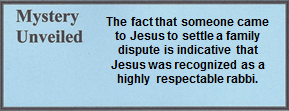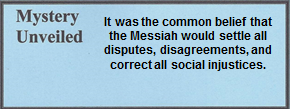09.03.02 Lk. 12:13-21
FAITH OF THE FOOLISH RICH MAN
13 Someone from the crowd said to Him, “Teacher, tell my brother to divide the inheritance with me.”
14 “Friend,” He said to him, “who appointed Me a judge or arbitrator over you?” 15 He then told them, “Watch out and be on guard against all greed because one’s life is not in the abundance of his possessions.”
A 16 Then He told them a parable:
“A rich man’s land
Was very productive.
B 17 He thought to himself,
What shall I do,
since I don’t have anywhere to store my crops?”
C 18 I will do this,’ he said.
‘I’ll tear down my barns and build bigger ones,
and store all my grain and my goods there.
B’ 19 Then I’ll say to myself,
“You have many goods stored up for many years.
Take it easy; eat, drink, and enjoy yourself.”’
A’ 20 “But God said to him, ‘You fool!
This very night your life is demanded of you.
And the things you have prepared — whose will they be?’
21 “That’s how it is with the one who stores up treasure for himself and is not rich toward God.”
Literary Style.[1] The poetic parallelism of verses 16-20, reveal matching ideas. In stanza A, the rich man spoke to himself, but in A,’ God spoke to him. In the same stanzas, crops produced by the fertile land are acquired in A, while in A’ these are left behind upon the man’s death. In stanza B, this rich fool describes his problem while in B’ he believes he has the perfect solution to it. The theme or focus is stanza C, where he is building to secure his life for the future, but God concludes with the general principle that gathering earthly treasures is not gathering treasures in heaven.
In this discussion of inheritance, Jesus refused to get involved because both men were worshipers of the same God, were members of the same family, but were separated because of a dispute over a piece of property. They were dominated by their self-interests which crippled their ability to see the principles of God that pertained to their lives. A court judge or rabbi was not what was needed, but a realization of the greed that was evident in their family. The narrative reveals how well social justice was developed at this time.
“Divide the inheritance.” It was not uncommon for people to take their problems and conflicts to a respected rabbi, or, if a rabbi could not be found, a carpenter was asked to resolve the problem.[2] On the other hand, it was a common practice for itinerant rabbis to travel from village to village where they would serve in a judicial capacity and render decisions on civil and religious matters.
The Romans had given the Jews sufficient autonomy concerning judicial matters with the authority to enforce compliance of a decision if necessary. In this case, the man did not request Jesus to act as a fair judge in a family matter of inheritance, but rather, be his advocate and have the inheritance divided (verse 13). The issue appears not to be of fairness, but of greed. While some rabbis would have accepted the offer, Jesus refused to render a decision, not because He was unqualified or unconcerned, but because in this situation, He focused on those who have no right to judge others.

“You fool!” This man failed to think wisely. When security for the future is placed in material possessions, Jesus calls the man a fool (Gk. aphron 878), which signifies without reason, one who was reckless.[3] The Pharisees, scribes, and Sadducees had their confidence for a secure future placed in various assets.
Jesus spoke Hebrew and Aramaic, and in Hebrew the term (ewil 191) means one who mocks guilt (Prov. 14:9), despises wisdom and discipline (Prov. 1:7; 15:5), and any attempt to give a fool instruction is futile (Prov. 16:22).[4] In essence, a fool is one who has rejected the knowledge of God and, therefore, is damned to hell. When Jesus called this man a fool, He most certainly had a greater realm of Hebraic meaning than Greek. Jesus condemned them for this and warned the disciples not to do likewise. Wealth is not to be a god but a tool to be used wisely to expand the Kingdom of God.
In Hebrew, the most common word for righteous, righteousness, and charity is tzedakah (Gk. dikaiosune 1343). The acts of charity in the giving of offerings and alms, in addition to the regular tithes, are considered as righteous. Furthermore, one was not considered righteous if he failed to demonstrate charity. For this reason, when Jesus recognized a true heart for charity, He identified the individual as righteous and that salvation was brought to him. The issue of whether to give tithes was never a question.[5]

[1]. Bailey, Poet and Peasant. Part II, 57; Fleming, The Parables of Jesus. 76; Bailey, Jesus through Middle Eastern Eyes. 299.
[2]. Lightfoot, A Commentary on the New Testament from the Talmud and Hebraica. 3:53.
[3]. Vine, “Fool.” Vine’s Complete Expository Dictionary. 2:246.
[4]. Vine, “Fool.” Vine’s Complete Expository Dictionary. 1:85 and “Stupid Fellow.” 1:251.
[5]. See additional rules on tithing in the Mishnah, Ma’aserot 1.1 and Moed Shabbath 4.7.